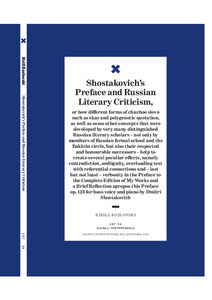Shostakovich's Preface and Russian Literary Criticism : or how different forms of chuzhoe slovo such as skaz and polygenetic quotation, as well as some other concepts that were developed by very many distinguished Russian literary scholars – not only by members of Russian formal school and the Bakhtin circle, but also their respected and honourable successors – help to create several peculiar effects, namely contradiction, ambiguity, overloading text with referential connections and – last but not least – verbosity in the Preface to the Complete Edition of My Works and a Brief Reflection apropos this Preface op. 123 for bass voice and piano by Dmitri Shostakovich
Kozlovski, Kirill (2017)
Kozlovski, Kirill
Taideyliopiston Sibelius-Akatemia
2017
1237-4229
978-952-329-069-3
Tohtoritutkinto. Taiteilijakoulutus
DocMus
EST-julkaisusarja 34
Julkaisun pysyvä osoite on
https://urn.fi/URN:ISBN:978-952-329-069-3
https://urn.fi/URN:ISBN:978-952-329-069-3
Kuvaus
Taiteilijakoulutuksen tohtorintutkintoon liittyvä kirjallinen työ.
Tiivistelmä
Kiril Kozlovsky
University of Arts Helsinki, Sibelius-Academy, DocMus Doctoral School, 17.10.2016.
Shostakovich's Preface and Russian Literary Criticism. Or how different forms of chuzhoe slovo such as skaz and polygenetic quotation, as well as some other concepts that were developed by very many distinguished Russian literary scholars – not only by members of Russian formal school and the Bakhtin circle, but also their respected and honourable successors – help to create several peculiar effects, namely contradiction, ambiguity, overloading text with referential connections and – last but not least – verbosity in the Preface to Complete Edition of My Works and a Brief Recollection on the subject of this Preface op. 123 for bass voice and piano by Dmitri Shostakovich.
The thesis is an analysis of Dmitri Shostakovich's Predislovie k polnomu sobraniju moih sochinenij I kratkoe razmyshlenie po povodu etogo predislovija op. 123 using a methodological framework taken from writings of Russian literary critics of the early 20th century and their followers.
In the first chapter several key notions are introduced and contextualised – namely, polygenetic quotation, skaz and ambiguity. The claim is stated, that Preface could be analysed in the similar way to Boris Eikhenbaum's analysis of Gogol's Shinel.
The second chapter is dedicated to analysing and contextualising four musical polygenetic quotations (Mints) in Preface. Quotation sources are mostly works by Mussorgsky (Boris Godunov, Seminarist) and Shostakovich himself (Kazn' Stepana Razina, Satiry, 13th Symphony).
In the third chapter parallels are drawn between the skaz technique of Mikhail Zoshchenko and certain aspects of Preface – both verbal and musical. Verbosity, tautology, usage of bureaucratic lexis as well as similarities of syntactic structures are compared in Zoshchenko's stories and Shostakovich's Preface. Verbosity is seen as a metaphoric "death of words", therefore different aspects of death – both artistic or physical – are reflected upon.
The fourth chapter concentrates on analysing and characterising the narrator of Preface as well as his relationship to the text and its physical author. Notions of plagiarism, graphomania and death of the author are traced in connection with narrator's figure in Preface making use of Shostakovich's biography and verbal texts. A special emphasis is made on the metatextual qualities of Preface. The work is seen as a transition piece in Shostakovich's vocal output – marking a turning point from subjects concerning social to timeless issues of death and artistic creativity.
The last chapter presents a personal overview of the problem of artistic research – against the biographical background of the author, aiming at discharging the whole dichotomy of artistic research versus artistic practice.
University of Arts Helsinki, Sibelius-Academy, DocMus Doctoral School, 17.10.2016.
Shostakovich's Preface and Russian Literary Criticism. Or how different forms of chuzhoe slovo such as skaz and polygenetic quotation, as well as some other concepts that were developed by very many distinguished Russian literary scholars – not only by members of Russian formal school and the Bakhtin circle, but also their respected and honourable successors – help to create several peculiar effects, namely contradiction, ambiguity, overloading text with referential connections and – last but not least – verbosity in the Preface to Complete Edition of My Works and a Brief Recollection on the subject of this Preface op. 123 for bass voice and piano by Dmitri Shostakovich.
The thesis is an analysis of Dmitri Shostakovich's Predislovie k polnomu sobraniju moih sochinenij I kratkoe razmyshlenie po povodu etogo predislovija op. 123 using a methodological framework taken from writings of Russian literary critics of the early 20th century and their followers.
In the first chapter several key notions are introduced and contextualised – namely, polygenetic quotation, skaz and ambiguity. The claim is stated, that Preface could be analysed in the similar way to Boris Eikhenbaum's analysis of Gogol's Shinel.
The second chapter is dedicated to analysing and contextualising four musical polygenetic quotations (Mints) in Preface. Quotation sources are mostly works by Mussorgsky (Boris Godunov, Seminarist) and Shostakovich himself (Kazn' Stepana Razina, Satiry, 13th Symphony).
In the third chapter parallels are drawn between the skaz technique of Mikhail Zoshchenko and certain aspects of Preface – both verbal and musical. Verbosity, tautology, usage of bureaucratic lexis as well as similarities of syntactic structures are compared in Zoshchenko's stories and Shostakovich's Preface. Verbosity is seen as a metaphoric "death of words", therefore different aspects of death – both artistic or physical – are reflected upon.
The fourth chapter concentrates on analysing and characterising the narrator of Preface as well as his relationship to the text and its physical author. Notions of plagiarism, graphomania and death of the author are traced in connection with narrator's figure in Preface making use of Shostakovich's biography and verbal texts. A special emphasis is made on the metatextual qualities of Preface. The work is seen as a transition piece in Shostakovich's vocal output – marking a turning point from subjects concerning social to timeless issues of death and artistic creativity.
The last chapter presents a personal overview of the problem of artistic research – against the biographical background of the author, aiming at discharging the whole dichotomy of artistic research versus artistic practice.
Kokoelmat
- Kirjalliset opinnäytteet [1403]
